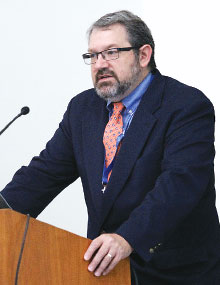Computational Psychiatry Might Be Game Changer, Says NIMH Director
Abstract
By fostering an ongoing dialogue between data-driven theoreticians and psychiatrists, NIMH hopes to accelerate knowledge that will improve the lives of individuals with mental illness.
Having an extensive background in neuroscience research, Joshua Gordon, M.D., Ph.D., director of the National Institute of Mental Health (NIMH), remembers the promise that the genomics revolution was supposed to bring to psychiatry some years back. Though genetic studies have greatly increased the understanding of how the brain works, the ability of genetics to dramatically improve patient treatment and recovery has not yet materialized.

NIMH is putting the power of computers to work to take advantage of large datasets categorizing brain dysfunction in a way that has the potential to lead to improved biomarkers and better diagnoses, says Joshua Gordon, M.D., Ph.D.
Despite these challenges, Gordon and NIMH are enthusiastic about the potential of using the mathematical, graphical, and data storage capabilities of computers in psychiatry research (including psychiatric genomics). At a special session at APA’s 2018 Annual Meeting last month, Gordon discussed how and why he thinks computational psychiatry can be a game changer.
Take the DSM-5 definition of posttraumatic stress disorder (PTSD) as an example. DSM-5 requires patients to have a minimum number of symptoms from each of four symptom clusters; given the extensive list of symptoms, there are over 636,000 different combinations of symptoms that could lead to a diagnosis of PTSD.
“Does this mean there are thousands of different things that can go wrong with the brain to cause PTSD, or that there is one thing wrong that can manifest in countless ways?” Gordon asked. “Computational approaches have the potential to answer these kinds of questions.”
Most clinicians might think of data mining when the term computational psychiatry comes up, and NIMH is putting resources into Big Data projects, Gordon said. But there are other applications facilitated by computers that researchers may be able to use to better understand the complexity of the brain.
The first is biophysical modeling; this involves designing simulated biological systems—like a neural circuit—using known properties of that system. Biophysical models of neural circuits enable researchers to ask many fundamental questions, including “What might happen if I knock out this one receptor?” or “What happens if we add another connection?”
The second is computational phenotyping, which involves breaking down complex behaviors into smaller components. Gordon cited a recent study that used such phenotyping: researchers had subjects play a mobile chance-based rewards game and indicate their happiness at various intervals, such as right after losing some points. With that information, the investigators were able to collect information on levels of moment-to-moment feelings as the participants won or lost points and track how happiness ratings changed over time. In a sense, the investigators were able to take an amorphous concept like happiness and define it in a discrete manner related to how the brain processes rewards and losses.
Echoing his earlier comments, however, Gordon stressed that the power of computers was not a panacea for the mental health field. “This is a tool we have to use responsibly.” ■



